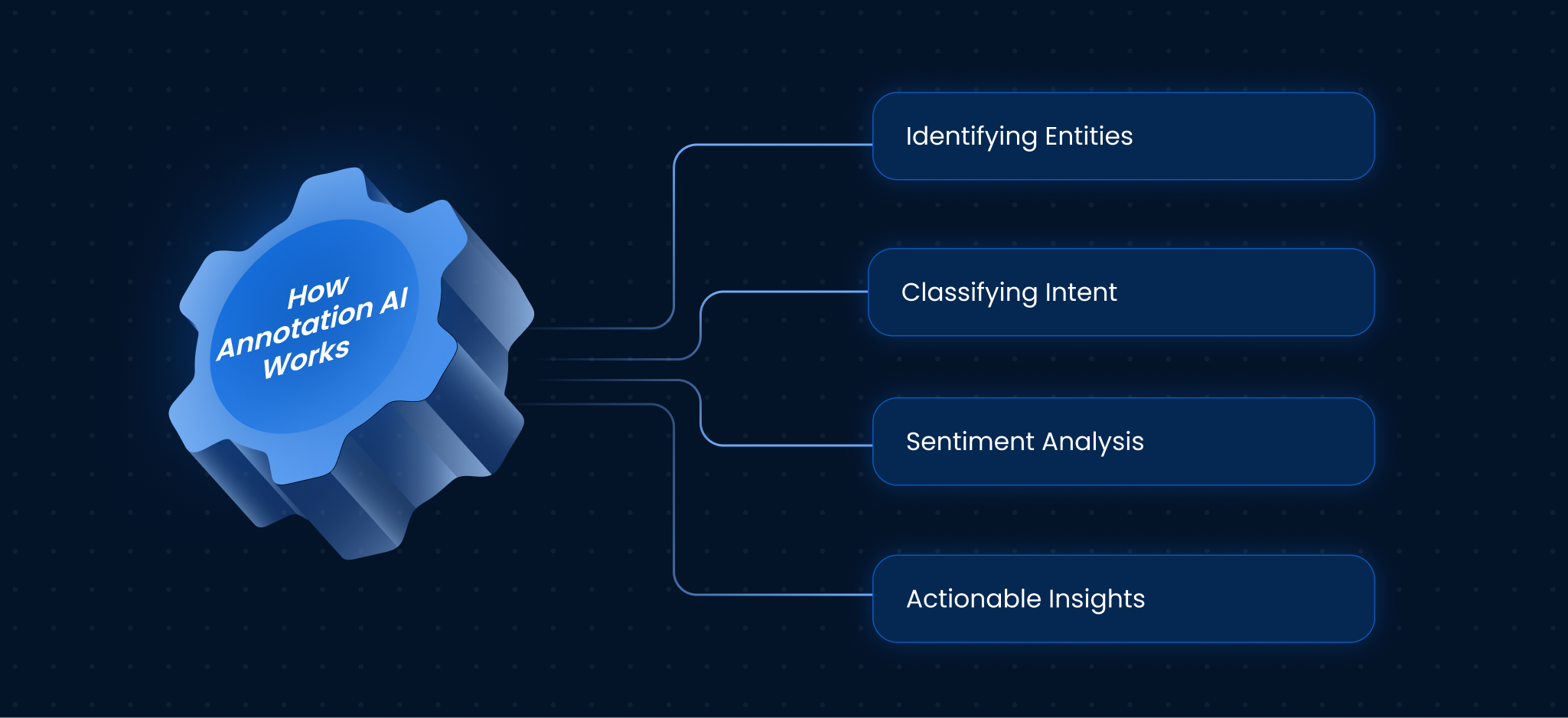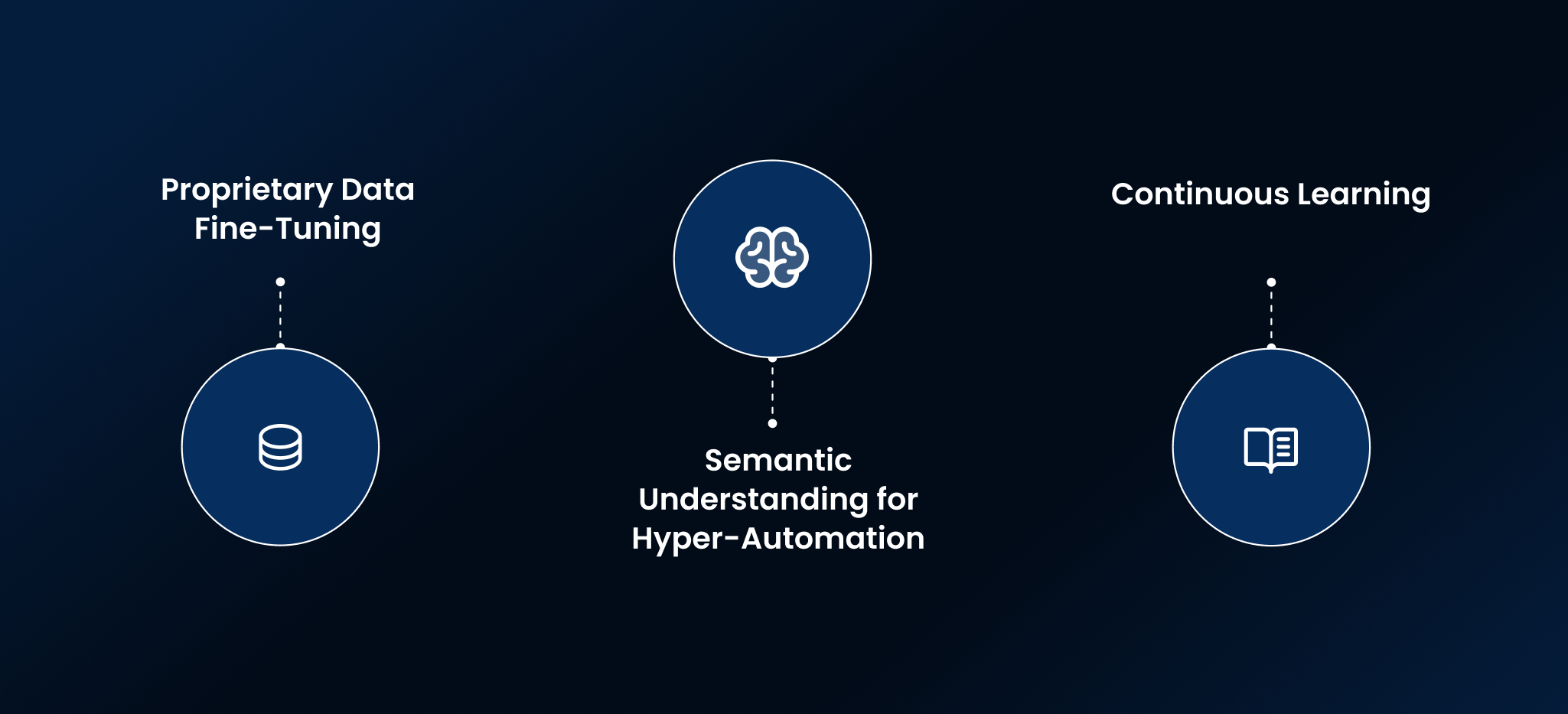Introduction
In the dynamic landscape of enterprise technology, the conversation has moved beyond mere automation. Today, forward-thinking CIOs, CTOs, and Technology Heads are setting their sights on Agentic AI , intelligent systems that don’t just execute tasks but understand intent, plan actions, and autonomously resolve complex issues. At the heart of this transformative shift lies annotation AI, the unsung hero that meticulously trains these advanced systems to perform at an enterprise scale.
As we look towards 2025, the ability to rapidly and accurately resolve employee IT, HR, and Finance tickets isn’t just about efficiency; it’s about elevating the employee experience, freeing up valuable human capital, and gaining a competitive edge. This isn’t just theory; it’s about making your operational spend work smarter, not harder.
What is Annotation AI?
Simply put, annotation AI is the process of labeling or tagging data with meaningful information that teaches artificial intelligence models how to understand and interpret patterns. Think of it as providing highly detailed instructions to a diligent student. For an AI, this data could be text from an employee’s IT ticket, a screenshot of an error message, a voice recording of an HR inquiry, or even numerical data from a financial request.
Every piece of data is enriched with context, categories, sentiment, and intent. For instance, a text describing “my laptop won’t connect to the Wi-Fi” might be tagged not just as “IT issue,” but also as “network connectivity,” “high urgency,” and “employee unable to work.” This granular level of detail is absolutely crucial for training sophisticated AI that can move beyond simple keyword matching to genuine understanding.
How Annotation AI Works
The journey of annotation AI begins with raw, unstructured data from your existing systems , perhaps thousands of past support tickets, chat logs, or knowledge base articles. Expert human annotators, often with specialized domain knowledge, meticulously review and tag this data. For example:
- Identifying Entities: Marking specific names, dates, product types, or system error codes within a text.
- Classifying Intent: Determining if an employee’s message is a request for information, a report of a problem, or a request for a service.
- Sentiment Analysis: Gauging the emotional tone of a message , is the employee frustrated, calm, or urgent?
- Actionable Insights: Pinpointing specific actions that were taken or needed to resolve an issue in the past.
This annotated data then becomes the training material for machine learning models. The models learn from these examples, gradually becoming capable of making similar annotations and decisions on new, unseen data. Consequently, the quality and precision of the initial annotation AI directly dictate the accuracy and intelligence of the resulting AI system.

Key Benefits of Annotation AI for Enterprises
The strategic advantages of leveraging annotation AI are profound, directly impacting your bottom line and operational excellence.
- Hyper-Automation of Ticket Resolution: By training AI with meticulously annotated data, you enable it to understand the nuances of employee requests. This allows for truly autonomous resolution of routine IT, HR, and Finance tickets, significantly reducing manual effort. Imagine an AI agent instantly identifying a password reset request and executing it without human intervention.
- Enhanced Employee Experience: Faster, more accurate resolutions mean happier employees. They get their issues addressed quickly, leading to less downtime and frustration. In turn, this fosters a more productive and engaged workforce.
- Significant Cost Reduction: Automating ticket resolution through AI driven by quality annotation slashes operational costs associated with staffing, training, and manual processing. This allows your human experts to focus on complex, high-value tasks.
- Predictive and Proactive Support: Annotation of historical data, including common error messages, system logs, and user behavior, enables AI to identify patterns and predict potential issues before they even become tickets. This allows your teams to resolve problems proactively, often before employees even notice a disruption.
- Scalability and Consistency: AI agents don’t get tired, nor do they deviate from established protocols. Once trained with high-quality annotated data, they provide consistent, high-quality support 24/7, scaling effortlessly with your enterprise’s growth.
Common Use Cases of Annotation AI
Annotation AI underpins a wide array of powerful applications in the enterprise.
-
Intelligent Ticket Routing: Precisely categorizing and routing incoming IT, HR, or Finance tickets to the correct department or agent the first time, based on deep semantic understanding rather than keywords alone.
-
Automated Response Generation: Training AI to craft accurate, context-aware, and personalized responses to common queries, dramatically reducing resolution times.
-
Knowledge Base Optimization: Identifying gaps in your existing knowledge base and suggesting new articles or improvements based on recurring, unanswered questions.
-
Chatbot and Virtual Assistant Training: Providing the critical intelligence for conversational AI to understand natural language, interpret intent, and hold meaningful interactions.
-
Root Cause Analysis: Analyzing patterns across thousands of annotated tickets to identify systemic issues that repeatedly generate problems, allowing you to fix the underlying cause rather than just the symptoms.
Challenges in Implementing Annotation AI
While the benefits are clear, implementing annotation AI effectively does present certain considerations.
- Data Volume and Quality: Enterprises possess vast amounts of data, but not all of it is suitable for direct annotation. Ensuring the data is relevant, representative, and clean is a foundational step.
- Expert Human Involvement: Initial annotation often requires human subject matter experts. This can be time-consuming and costly if not managed efficiently. Furthermore, maintaining consistency across multiple annotators is vital.
- Bias Mitigation: If the historical data used for annotation contains inherent biases, the AI models trained on it will perpetuate those biases. Active strategies are needed to identify and neutralize these.
- Data Privacy and Security: Ticketing data often contains sensitive employee information. Therefore, robust processes for PII (Personally Identifiable Information) redaction and secure data handling during annotation are non-negotiable for compliance.
- Evolving Needs: As business processes and employee needs change, the AI models need continuous refinement. This necessitates ongoing annotation and retraining to keep the systems current and effective.
Annotation AI vs. Traditional Data Labeling Methods
While the terms are sometimes used interchangeably, it’s helpful to distinguish the strategic intent. Traditional data labeling often focuses on simple classification , “this is an IT ticket,” “this is an HR ticket.” It’s foundational but limited.
Annotation AI, however, implies a more sophisticated, nuanced, and strategic approach. It’s about enriching data with a depth of understanding that enables truly intelligent, multi-step actions. It’s the difference between merely identifying a problem and equipping an AI to solve it, and even proactively prevent it. This advanced perspective is critical for empowering Agentic AI to function autonomously in complex enterprise environments.
How Leena AI Leverages Annotation AI
At Leena AI, annotation AI is not just a feature; it’s the core engine driving our Agentic AI platform. We understand that generic AI solutions fall short for large enterprises with unique processes and vast amounts of proprietary data.
We apply advanced annotation AI to meticulously train our models on your enterprise’s specific IT, HR, and Finance data. This isn’t about fitting a square peg into a round hole; it’s about customizing an intelligent system that speaks your company’s language, understands your unique workflows, and adheres to your specific policies.
- Proprietary Data Fine-Tuning: We don’t just use off-the-shelf large language models. Instead, we use your securely annotated historical ticket data, knowledge bases, and policy documents to fine-tune our Agentic AI. This creates a highly specialized, secure, and accurate AI agent tailored to your enterprise.
- Semantic Understanding for Hyper-Automation: Our focus on deep semantic annotation AI allows our agents to grasp the true intent and context of employee requests. This enables true hyper-automation, where multi-step issues can be resolved end-to-end without human intervention, from a password reset to a complex software access request.
- Continuous Learning: We leverage ongoing annotation AI of new interactions and human-validated resolutions to continuously improve the accuracy and capabilities of your AI agents, ensuring they evolve with your business needs.

Leena AI’s Pioneering Agentic AI in IT: Unlocking Value
In the realm of IT, Leena AI’s Agentic AI solutions, powered by sophisticated annotation AI, are designed to revolutionize how employees interact with IT support. For CIOs and Technology Heads, this means:
- Instant Resolution for Common IT Issues: From unlocking accounts and resetting passwords to granting access and troubleshooting software, our agents autonomously resolve 70-80% of routine IT tickets. This is achieved by precise annotation of your specific system configurations, access matrices, and troubleshooting steps.
- Reduced MTTR (Mean Time to Resolution): By enabling self-service and automating ticket resolution, employees get instant help, drastically cutting down the time it takes to resolve issues.
- Freeing Up IT Teams: Your highly skilled IT professionals are no longer bogged down by repetitive tasks. They can dedicate their expertise to strategic initiatives, complex problem-solving, and innovation.
- 24/7 Support, Globally: Regardless of time zones, your employees have access to immediate IT support, ensuring business continuity and productivity around the clock.
Consider an employee needing access to a new project management tool. Instead of filing a ticket and waiting, they simply ask the Leena AI agent. Thanks to meticulous annotation AI of your access policies and system integrations, the agent understands the request, verifies permissions, and provisions access instantly. This is the power of true Agentic AI, driven by precise and intelligent annotation.
Future of Annotation AI in Enterprise AI Systems
Looking ahead, annotation AI will become even more sophisticated and integrated.
-
Synthetic Data Generation: We will see more advanced techniques to generate high-quality synthetic data from expertly annotated datasets. This will help overcome data scarcity and privacy concerns, allowing for robust model training without relying solely on real, potentially sensitive, employee data.
-
AI-Assisted Annotation: AI itself will increasingly assist in the annotation process, suggesting labels and classifications, thereby speeding up the process and reducing human effort while maintaining high quality.
-
Multi-Modal Annotation: Beyond text, annotation will expand to seamlessly integrate voice, video, and image data, enabling AI agents to understand and respond to richer forms of employee input.
-
Explainable AI (XAI) driven by Annotation: Future annotation efforts will increasingly focus on not just what the AI decided, but why. This will be crucial for auditability, trust, and continuous improvement in enterprise AI systems.
Annotation AI is not a fleeting trend; it is a fundamental pillar upon which the most effective and intelligent enterprise AI systems are built. For technology leaders seeking to drive hyper-automation, enhance employee experience, and achieve significant operational efficiencies, understanding and strategically implementing advanced annotation AI is paramount for success in 2025 and beyond.
Frequently Asked Questions (FAQs)
What exactly does Annotation AI do for our existing ticketing systems?
Annotation AI transforms your historical ticket data into structured, intelligent training material. It teaches AI models to understand the nuances of employee requests, enabling them to automatically categorize, route, and even resolve tickets, significantly improving efficiency.
How does Annotation AI contribute to cost savings in IT, HR, and Finance?
By enabling AI agents to autonomously handle routine queries and multi-step tasks, annotation AI drastically reduces the need for human intervention in ticket resolution. This lowers operational costs, frees up your specialized teams, and ensures faster service, which in turn reduces employee downtime.
Is data privacy a concern with Annotation AI?
Absolutely. Data privacy is a critical consideration. Reputable annotation AI processes include robust methods for PII (Personally Identifiable Information) redaction and secure data handling. This ensures that sensitive employee data is protected during the training of AI models, maintaining compliance with regulations.
How does Annotation AI improve the employee experience?
With annotation AI powering your Agentic AI, employees receive instant, accurate, and consistent support for their IT, HR, and Finance needs. This reduces frustration, eliminates wait times, and allows them to get back to work faster, directly enhancing their overall satisfaction and productivity.
What is the difference between data labeling and Annotation AI for enterprises?
While data labeling is a broad term, annotation AI for enterprises refers to a more sophisticated, strategic process. It involves deep contextual tagging of data to train AI models for complex understanding, intent recognition, and multi-step autonomous actions, which is crucial for Agentic AI solutions.
Can Annotation AI help us predict and prevent future issues?
Yes, by meticulously annotating historical system data, performance logs, and past ticket trends, annotation AI enables predictive analytics. AI can then identify recurring patterns and potential problems before they escalate, allowing your teams to proactively address issues before they become critical tickets.













